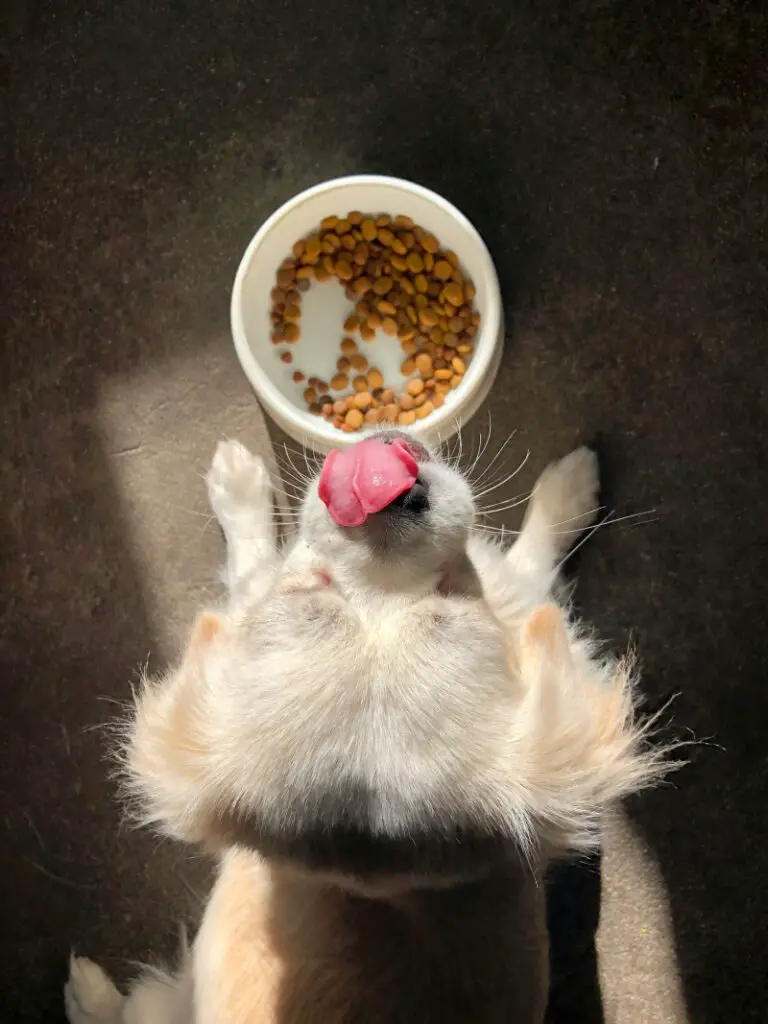In the past, it was common for dogs to wander around, steal eggs from nests and eat them raw, including the shell. Today, the life of the domestic dog is quite different. Although the egg is still part of the canine diet, the truth is that there are some misunderstandings about it.
Can dogs eat eggs? Should I give my dog eggs? Are eggs good for dogs? What happens if a dog eats raw eggs? At Sweet Doggo we explain everything you need to know about dogs and eggs: consumption, quantity, preparation, advice, and warnings to take into account.
Table of Contents
Is the egg good or bad for dogs?
In a few words, the egg is considered an excellent food, ideal to complement any canine diet. Specifically, the common chicken egg found in most homes provides significant amounts of protein, fat, vitamins, and minerals.
To the question of whether dogs can eat the egg, the answer is ” Absolutely yes “.
Dogs can eat eggs as part of their regular diet. In fact, they are considered a highly digestible source of protein with great nutritional value. Both the white and the egg yolk contain amino acids, fats, minerals, and vitamins essential for the health and well-being of the pet. Even so, it is important that they eat it in the correct quantity and form of preparation.
Eggs are a nutritious, safe, and inexpensive type of food that helps supplement a dog’s diet, especially if the dog is fed a homemade diet. As with other human foods, moderation is key.
Can puppies eat eggs too?
In general, puppies can eat eggs without this being a problem. However, it is recommended to introduce it gradually, starting with a small portion to watch for possible adverse reactions (change in stool, lack of appetite). Due to its fat and cholesterol content, it is best to limit egg consumption in puppies to only 1-2 times per week.
Note. Your vet can offer specific guidance on how and when to supplement the puppy diet with new foods.
What benefits does the egg have for dogs?
Thanks to the nutritional power of eggs, their regular and moderate consumption can have health benefits for your dog. The white, the yolk, and even the skin have much to offer in terms of nutrition and health.
1. Good source of protein
Needless to say, the importance of proteins in the diet of our dogs. They are not only essential for the growth of tissues and muscles, but also for the execution of numerous vital processes. The humble egg, especially the white, is rich in amino acids such as arginine, histidine, isoleucine, leucine, lysine, methionine, phenylalanine, threonine, tryptophan, and valine.
2. Fatty acid content
Concentrated mainly in the yolk, the fatty acids in the egg support the construction and maintenance of numerous tissues in the body, favor the absorption of nutrients and promote greater shine and softness in the dog’s coat.
3. Excellent supply of vitamins
The egg is an impressive source of vitamins, which together contribute to a better metabolism, growth, and immunity of the organism. This includes vitamin A, E, K, D, B1, B2, B3, B6, B12, folic acid, and choline. These vitamins are mostly concentrated in the yolk.
4. High content of essential minerals
Egg minerals act as catalysts and building blocks in a variety of processes, including metabolism, immune function, and dog growth and development. Among them are calcium, phosphorus, magnesium, sodium, potassium, iron, copper, zinc, manganese, iodine, and selenium. Although they are also found in egg whites and yolks, these nutrients are more concentrated in the eggshell.
The average egg contains between 60 and 70 calories, 6 grams of protein, and 4 milligrams of fat.
Now that we know why eggs are good for dogs, let’s see what is the correct way to give them to them…
How to give eggs to dogs?
The general recommendation is that dogs should eat a boiled egg. The most common and safe form of consumption is the boiled egg, cut into pieces. Although they can also eat scrambled or poached eggs, it is important not to add any kind of seasoning. Avoid giving egg preparations that have been made for human consumption.
In addition, dogs can also eat eggs as an ingredient in different homemade recipes, for example, cookies, fries, croquettes… and many other treats.
How many eggs can a dog eat in a day?
Starting from the fact that the egg is considered a compliment or treat within the canine diet, it should always be administered in moderation. The recommended portion is 1 egg per day, but this amount should be adjusted depending on the dog’s age, size, health status, and level of physical activity.
Large or giant dogs could eat 1 whole egg (normal size) a day without problems, but in the case of a small or medium dog, it is advisable to only give half.
That is why the preferred cooking method for dogs is the hard-boiled egg, as it allows for better adjustment of portions.
You can serve 1/2 small egg with the dog food, 1/2 boiled egg with a small portion of white rice, or give several small egg bits as a reward or snack.
How often can dogs eat eggs?
Many owners ask themselves: how many times a week can I give my dog eggs?
Although some dogs can eat eggs every day, this is not recommended in most cases, especially when they are puppies, small dogs, or sick dogs. To be on the safe side, it is best to give them eggs only 2-3 times a week, always cooked, unseasoned, and in moderation.
Additional Tips
- Avoid giving your dog expired eggs. It is safest to eat fresh eggs, properly refrigerated.
- Whenever possible, serve an egg that has been cooked immediately or recently.
- If you want to store hard-boiled eggs for later use, make sure you refrigerate them well.
- Grass-fed, free-range eggs are said to be more nutritious (higher in healthy omega-3 fats).
Easy Recipe: Homemade Egg and Spinach Frittata for Dogs
Ingredients
- 1 cup spinach, washed and chopped, fresh or frozen
- 4 beaten eggs
- ½ cup nonfat Greek yogurt
- ½ ripe tomato, cut into small cubes
Steps
- Preheat oven to 400°F (200°C).
- In a bowl, mix all the ingredients until well integrated with the eggs.
- On a small cupcake tray, place paper cups and pour the mixture into each of the cups, making sure to fill only ¾ full.
- Return to the oven and bake for 15-18 minutes, or until the frittatas are cooked through and lightly golden. Remove them from the molds and let them cool.
It may interest you: Can Dogs Eat Tomatoes and their Derivatives? Risks and Consumption
Can dogs eat raw eggs?
There is some debate about whether raw eggs are good or bad for dogs. Although still considered a safe alternative by some sources, the general rule of thumb is that a dog should never eat raw or undercooked eggs. Raw eggs can put your pet at risk for illness from Salmonella and other bacteria.
On the other hand, some dogs have been known to experience an upset stomach (vomiting, diarrhea) after eating raw eggs.
Contraindications and warnings to consider
Despite being an excellent food for dogs and cats, inadequate egg consumption can have negative consequences for the well-being and health of our pets.
Whether you want to give the egg as a treat, or as a protein source in a homemade diet, consider the following contraindications and warnings :
Gastrointestinal symptoms
Some dogs may have difficulty digesting the egg, which is why they have gastrointestinal discomfort. This is usually more common in puppies and dogs that have a chronic health conditions.
Overweight
Because the egg is a food rich in fat and cholesterol, its excessive intake in dogs can lead to weight gain. Avoid giving your pet too many eggs, especially if he is a small breed puppy, a dog that does not do much physical activity, or if he is already overweight.
Salmonella infection
One of the most important precautions is related to the consumption of raw eggs, given the danger of Salmonella infection. Dogs with compromised immune systems are often at higher risk. A dog with salmonellosis may experience diarrhea (with blood and mucus), lethargy, fever, vomiting, among other symptoms.
Make sure you cook the egg well before your dog eats it.
Biotin deficiency
Biotin is a B vitamin that is very important for cell growth, metabolism, and the health of the coat and skin in dogs. Avidin, a glycoprotein present in egg white, is said to act as a biotin inhibitor, and therefore regular egg consumption could cause biotin deficiency.
It should be noted that this condition is quite rare in dogs and it would take an extraordinarily large egg intake to cause such a deficiency.
In addition, the yolk is also very rich in biotin. It is unlikely that there will be a deficiency if the dog is used to eating all parts of the egg, as well as other foods that also contain this vitamin, for example, liver.
Allergies
As with any other food, it may be the case that a dog is allergic to eggs. If it is the first time you eat it, it is advisable to start with a very small portion to observe your reaction. Warning signs to watch out for include sneezing, coughing, swelling, hives, or difficulty breathing.
In the event of an episode of allergy to eggs in dogs, contact the veterinarian immediately. On some occasions, food allergies can lead to anaphylaxis, a life-threatening condition.



